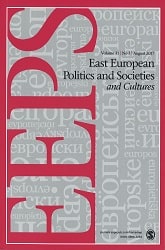The Role of Dissident Values in Institutional Choice. 1989 in Comparative Perspective
The Role of Dissident Values in Institutional Choice. 1989 in Comparative Perspective
Author(s): Alan RenwickSubject(s): Political history, Government/Political systems, Comparative politics, Post-War period (1950 - 1989), Transformation Period (1990 - 2010)
Published by: SAGE Publications Ltd
Keywords: dissidents; institutional choice; Czechoslovakia; Hungary; Poland;
Summary/Abstract: Choices of political institutions have been subject to increasing examination in recent years. The literature on these choices generally argues that they are driven primarily by politicians’ power interests, with impartial values playing at most a subservient role. Yet there are circumstances in which that may not be the case, in which values do come more to the fore. This article examines two propositions: that a principal legacy of significant democratic dissident activity is that it enhances the direct role of impartial values in initial choices of political institutions; and that the values involved have a specifically dissident hue. It begins by exploring theoretically the reasons for expecting these patterns. It then examines the propositions empirically through analysis of institutional choice in East-Central Europe in 1989 and 1990. The third section expands the analysis, first by using Linz and Stepan’s typology of nondemocratic regimes to consider the circumstances under which the posited mechanisms may operate, and then by tentatively exploring evidence from a broad range of cases. The article concludes that the circumstances in which dissident values matter significantly in institutional choices are rare but nevertheless generalizable. The analysis therefore provides a valuable addition to our understanding of institutional choice processes as well as of dissident legacies.
Journal: East European Politics and Societies
- Issue Year: 25/2011
- Issue No: 02
- Page Range: 296-317
- Page Count: 22
- Language: English
- Content File-PDF

